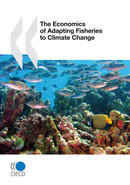Fisheries
Workshop on the Economics of Adapting Fisheries to Climate Change
Workshop on the Economics of Adapting Fisheries to Climate Change
with the support of the Governments of Korea and Canada
Busan, Korea, 10-11 June 2010
| The Economics of Adapting Fisheries to Climate Change Climate change will affect fisheries, fish stocks and coastal communities, but the form and extent of these impacts are uncertain. Policymakers must develop adaptable strategies for climate change while taking into account social and economic consequences. This book outlines the actions that fisheries policy makers must undertake in the face of climate change. |
Climate change is likely to have impacts on fishery productivity and stock distribution, which will result in redistribution of costs and benefits among different stakeholders. In addition, there is a great deal of uncertainty associated with interactions between climate change and fisheries and aquaculture.
This workshop provided fisheries policy makers with insights on how to develop strategies to adapt to climate change, taking into account social and economic consequences.
The objectives of the workshop were:
-
Increase our understanding on the interaction between climate change and fisheries/aquaculture from economic, social and institutional perspectives, taking into account risks and uncertainties involved;
-
Explore the fisheries policy and management toolbox that will increase flexibility, adaptability and resilience in the face of climate change; and
-
Provide insights to fisheries policy makers on how to respond to climate change and when to make decision under uncertainty.
|
Sessions and presentations |
The workshop was organized around five sessions (plus an opening and a closing session) that distilled lessons for policy makers with respect to climate change adaptation.
Session 1: Setting the Scene
This session provided an overview of the key economic issues and challenges that fisheries policy makers face in relation to climate change. Uncertainty associated with the interaction between climate change and fisheries has also been discussed as uncertainty is one of the most important factors that affect fisheries decision-making.
Adolf Kellermann, International Council for the Exploration of the Sea, Denmark
Science of climate change and fisheries
Ian Perry, Department of Fisheries and Oceans, Canada
Dealing with uncertainty: Implications for fisheries adaptation
Edward Miles, University of Washington, United States
Fisheries management and governance challenges in a changing climate
Session 2: Climate Change Impacts on Fisheries and Adaptation Strategies
This session identified possible impacts of climate change on capture fisheries. It also explored policy measures/options to respond to climate change and identify strengths and weaknesses of the measures to help policy makers in their decision-making. In addition, this session addressed challenges in managing stocks migrating between Exclusive Economic Zones as well as managing stocks in the high seas as climate change could have substantial impacts on fish migration and distribution.
Susan Hanna, Oregon States University, United States
Climate change impacts on capture fisheries: Economic and policy issues
Chang-ik Zhang, Pukyong National University, Korea
Assessment climate change impacts on fisheries: An ecosystem approach to fisheries perspective
Daniel Lane, University of Ottawa, Canada
David Fluharty, University of Washington, United States
Decision-making and action taking: Fisheries management in a changing climate
Rögnvaldur Hannesson, The Norwegian School of Economics and Business Administration, Norway
Climate change impacts on international fisheries and adaptation strategies
Session 3: National Fisheries Strategies of Adapting Strategies
In this session, participants shared the experiences of OECD member countries in identifying climate change impacts on fisheries, developing adaptation strategies and addressing associated social and economic consequences.
Pavlina Nicolova, DG-MARE, European Commission
Climate action and fisheries in the European Union
Kirsty Inglis, Department for Environment, Food and Rural Affairs (DEFRA), United Kingdom
Fisheries governance in the United Kingdom: Challenges and opportunities in a changing climate
Il-Jeong Jeong, Ministry for Food, Agriculture, Forestry and Fisheries, Korea
Korea's approach to adapt to climate change in the fisheries sector
Hsueh-Jung Lu, National Taiwan Ocean University, Chinese Taipei
The impact of climate change on Chinese Taipei coastal fisheries
Session 4: Adaptation Strategies for Developing Countries
This session looked at how developing countries can respond to challenges caused by climate change in the fisheries and aquaculture sector.
Graham Pilling, Centre for Environment, Fisheries and Aquaculture, United Kingdom
Vulnerability of developing countries to climate change
Kieran Kelleher, World Bank, Washington D.C. United States
Adaptation strategies to climate change in developing countries
Johann Bell, Secretariat of the Pacific Community,
Kee-Hyung Hwang, Korea Maritime Institute, Korea
Session 5: Political Economy of Adapting Fisheries to Climate Change
This session discussed political economy aspects of developing and implementing fisheries adaptation strategies to climate change, especially with respect to dealing with stakeholder’s expectations. It focused on how to deal with interactions among different interest groups, incorporating various perspectives from different players: policy makers, large fishing industries, small-scale fishing communities and NGOs.
Alastaire Macfarlane, New Zealand Seafood Industry Council, New Zealand
Large fishing industry's perspective in dealing with climate change
Jerker Tamelander, International Union for Conservation of Nature (IUCN), Switzerland
An NGO's perspective to fisheries management to adapt to climate change
Daniel Lee, BAP Coordinator, Global Aquaculture Alliance, United Kingdom
Aquaculture adaptation strategies to climate change: An aquaculture industry
Takanori Ohashi, Fisheries Agency, Japan
Fisheries policy maker's perspective
Related Documents
